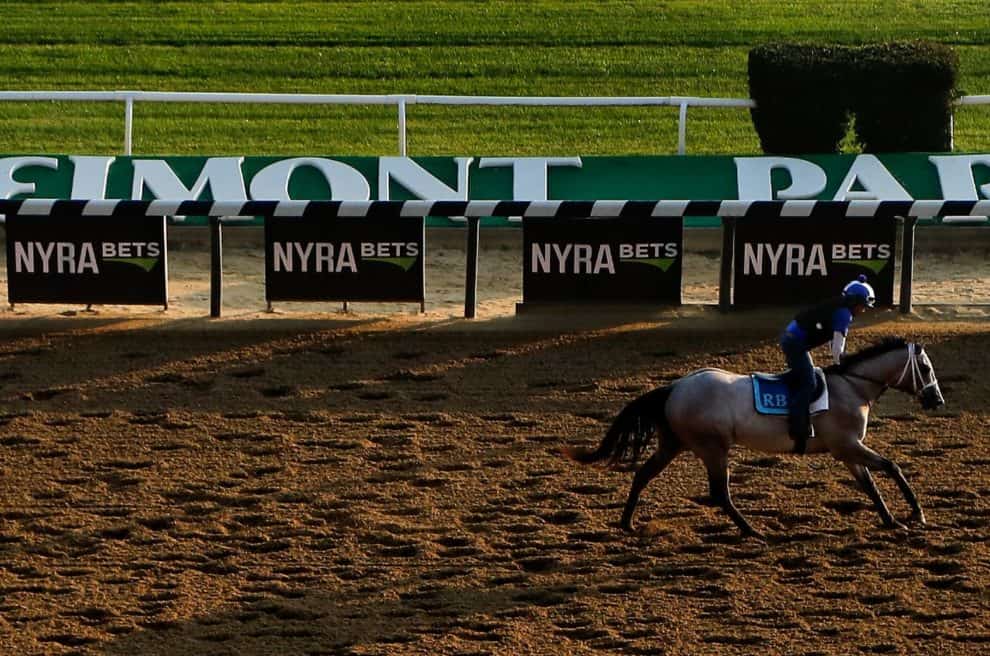
- In mid-May Bob Baffert was barred indefinitely from entering and stabling horses at New York Racing Association (NYRA) tracks.
- The duration of Baffert’s ban will be determined based on information from the Kentucky Horse Racing Commission’s investigation into the positive drug test of Kentucky Derby winner Medina Spirit.
- Baffert is now suing NYRA seeking that his ban be lifted and claiming a violation of due process.
Last week, Bob Baffert and the other connections of Kentucky Derby winner Medina Spirit sued the Kentucky Horse Racing Commission (KHRC). This week, they’ve set their sights on the New York Racing Association (NYRA) seeking to overturn a ban put into place in mid-May.
NYRA’s decision to ban Baffert stems from the ongoing situation with Kentucky Derby winner Medina Spirit’s positive drug test following the race. Medina Spirit tested positive for betamethasone, a regulated anti-inflammatory given to horses to reduce swelling in their joints. It’s a class of medication known as corticosteroids and is similar to what a human doctor might give a patient to expedite healing after an injury. According to Baffert, his horse tested positive for 21 picograms of the drug per milliliter of blood serum. The Hall of Fame trainer initially claimed that Medina Spirit had never been treated with betamethasone but several days later issued a statement that the horse had been treated with an anti-fungal ointment containing the substance.
In response to the failed drug test, Baffert was barred from Churchill Downs for two years. NYRA enacted an as-of-now indefinite ban in response to the move by Churchill Downs. Although the ban was described as ‘temporary’ by NYRA they made clear that it would be given a timeframe and conditions based on action by Kentucky regulators. Baffert’s drug test and sanction thereof has not yet been adjudicated by Kentucky’s horse racing oversight body and as of yet no hearing has been scheduled. This looks sketchy on the surface–it would be the KHRC’s call to suspend Baffert as well as to disqualify Medina Spirit from the May 1 Kentucky Derby giving the victory to Mandaloun.
What isn’t in question is Churchill Downs’ legal right to bar individuals. As a publicly held company, their right to ‘refuse service to anyone’ is well established in case law. Baffert hasn’t really had an adequate change to give his side of the story to Churchill Downs but as a private sector company they don’t really have to. Baffert’s legal team appears to realize this which is why their legal action in Kentucky was filed against state regulators.
NYRA is somewhat different. They’re a ‘quasi-public’ entity that operates the three New York racetracks under a franchise granted by the state. At the very least, this clouds and complicates their ability to ban licensees. Baffert’s suit claims that overstepped their legal authority in enacting the ban. Here’s the relevant quote from the lawsuit itself:
“NYRA does not have the legal authority to suspended Baffert – that rests solely with the [New York] Gaming Commission as the entity that issued his occupational license – a license that affords Baffert a property interest under state law sufficient to invoke due-process protections. Despite this fact, by purporting to summarily and indefinitely suspend Baffert from all NYRA tracks, NYRA has essentially barred Baffert from exercising his professional and state-issued license anywhere in the state of New York.”
The suit seeks a preliminary and permanent injunction against the ban along with a ‘declaration’ by the court that NYRA can’t ban Baffert from entering horses at New York tracks. Baffert’s attorney, Craig Robertson, had ‘no comment’ for several media outlets on Monday. NYRA spokesman Patrick McKenna hewed the party line:
“NYRA took this action to protect the integrity of the sport for our fans, the betting public, and racing participants.”
I’m not a lawyer, but as an experienced observer of gaming regulation Baffert might very well have a case. The inaction of the Kentucky Horse Racing Commission is problematic since by failing to act they’re leaving Baffert in a state of limbo over his ability to race in the state as well as the status of Medina Spirit’s Kentucky Derby victory. NYRA tying the duration and conditionality of their ban to this as of yet completed action is also questionable. If NYRA is usurping the duty of the New York Gaming Commission–and based on their action on other suspended trainers it sure looks like it–Baffert’s legal team might be holding a winning hand.
From the perspective of a horse racing analyst what I find most troubling is that due to questionable actions at the corporate and regulatory level Baffert has been prevented from entering horses without much recourse of an appeal. He might very well deserve a suspension in Kentucky and should that occur New York (and other states) would suspend him reciprocally. At the same time, he also deserves the right to give his side of the story and at the very least present mitigating evidence. He has not been afforded this right by the inaction in Kentucky and what could be some shenanigans of regulatory jurisdiction in New York. No matter what you think of Baffert personally having a fair and impartial system for sanctioning individuals that allows them the right to appeal and question these sanctions is crucial for the integrity of the sport.
It’ll never happen in New York, but the relationship between the state and NYRA is looking more and more dicey as time goes on and is likely deserving of some sort of investigation in itself. NYRA is trying to occupy some type of nether world between being a private company and a state regulatory body. They have a monopoly over horse racing in the state and have recently used that monopoly power to expand their ‘private sector’ influence–to wit: a deal with Fox Sports that gives the company an equity stake in NYRA’s mobile wagering platform.









